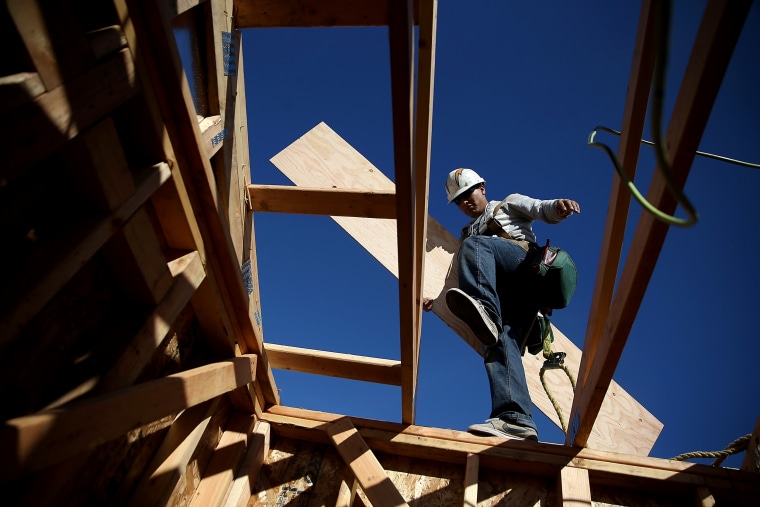Housing triggered the last recession. This time it's doing well, but not well enough to stop the next downturn.
Builder confidence in September was the most optimistic it has been in the past year, and August housing starts rose to their highest level since May 2007, according to the National Association of Home Builders. Home construction is up and borrowers lured by low rates are piling into the mortgage market.
A key driver is Fed activity — lower interest rates make mortgages more affordable and increase homeowners’ buying power.
Usually, interest rates don’t come down until the economy is already in trouble and people are less willing to buy, making this somewhat of a Goldilocks moment for housing.
“Right now, we’ve actually got the best of both worlds. We’ve got mortgage rates that are extremely low but an economy that’s doing fairly well,” McBride said.
In thriving economies, homebuying triggers spending in industries as diverse as construction, financial services and retail. A Fed rate cut in October would help extend this streak and buoy the consumer spending that has kept the domestic economy expanding even as manufacturing slides into recession and corporate chiefs defer investments.
Housing is a critical sector because it acts as a multiplier by touching a wide swath of industries, from construction to financial services to home-improvement and appliance sales.
The average rate for a typical mortgage dipped below 4 percent at the end of September, and the Mortgage Bankers Association says lower rates are contributing to an increase in homebuying as well as refinancing. Mortgage applications were up for the week ending Sept. 27 by around 8 percent from the previous week.
The dip in interest rates gives homebuyers, on average, around $50,000 more in “purchase ability,” said Todd Teta, chief product officer at Attom Data Solutions. “It allows people to buy more home,” he said. “That is meaningful on an absolute dollar basis for a lot of buyers."
Yet even with the tailwind of low rates, economists warned that the trade policies pursued by the Trump administration could hurt the housing market.
“Business sentiment has tanked, given the uncertain economic prospects in a world of slower global growth and unresolved trade disputes,” said Greg McBride, chief financial analyst at Bankrate.com.
The NAHB’s Dietz said higher building costs and worry over the potential of broader economic fallout from a China trade war continue to weigh on the industry, a theory echoed by other market observers.
“Presumably, homebuilders have been wary of the potential impact from the trade war on potential buyers' confidence,” Pantheon Macroeconomics chief economist Ian Shepherdson wrote in a recent note to clients.
Fannie Mae’s monthly home purchase sentiment index found that homebuyers are growing wary, as well. Fannie Mae senior vice president and chief economist Doug Duncan said more Americans are becoming worried about the economy overall, as well as their own financial circumstances.
Consumer sentiment in general correlates heavily to positive employment data and upward market movement, and Teta said recent volatility is the likely culprit for this sense of unease. “The gyrations in the stock market are hitting confidence,” he said.
Although the number of respondents to the Fannie Mae survey who said it is a good time to buy a home ticked up to 28 percent, the number who said it is a good time to sell grew by a larger percentage, to 44 percent. And while more than two-thirds of respondents still say they aren’t worried about job loss, that figure has been on the decline for two months in a row.
“If unemployment is rising, people that are nervous about losing their jobs are not going to buy houses,” McBride said. “If you don’t have a warm and fuzzy feeling about job and income prospects, you’re not going to go sign yourself up for the largest financial obligation of your life.”
